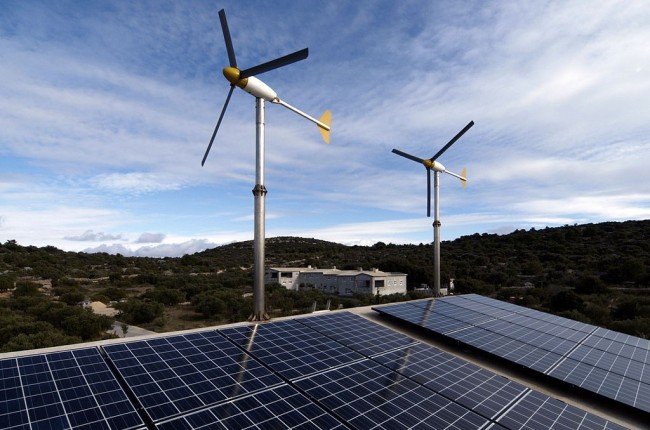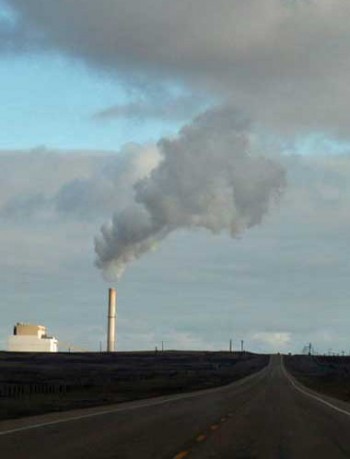
The best way to fuel the clean energy revolution? Put a tax on carbon
by Cleantech Canada Staff

Despite falling renewable costs, energy market unlikely to adopt clean sources without regulations, report says

Renewable energy continues to grow and improve, but without regulations it may not truly take flight, a new report says. PHOTO: Nenad Kajić, via Wikimedia Commons
CHICAGO—Renewable energy has taken remarkable strides over the past 10 or 15 years, but the reality is—according to a new study—the industry needs help.
The findings may come as a surprise for a business segment that has risen from a fledgling environmental movement to a billion-dollar industry, posting record-setting year after record-setting year. But despite significant efficiency improvements, the development of economies of scale and cost improvements virtually across the board, a team of researchers from the University of Chicago and the Massachusetts Institute of Technology, is convinced the fossil fuel industry will always be a step ahead.
“You often hear, when fossil fuel prices are going up, that if we just leave the market alone we’ll wean ourselves off fossil fuels,” Christopher Knittel, an energy economist at MIT, and one of the study’s authors, said. “But the message from the data is clear: that’s not going to happen any time soon.”
“If we don’t adopt new policies, we’re not going to be leaving fossil fuels in the ground,” he added “We need both a policy like a carbon tax and to put more R&D money into renewables.”

While renewables have grown significantly over the past 10 years, fossil fuels continue to make up a significant share of Canada’s energy mix. PHOTO: Paul Jerry, via Wikimedia Commons
Over the five years between 2009 and 2014, the cost of solar energy generation dropped by two-thirds. Though no doubt encouraging for renewable advocates, fossil fuel producers have innovated as well. In the U.S. alone, the report notes, oil reserves expanded 59 per cent between 2000 and 2014, while natural gas reserves grew by a whopping 94 per cent. Led by developments in fracking technology, as well as improved extraction methods for oilsand sites, traditional energy companies have been able to vastly increase their production while lowering costs, as well as make once inaccessible oil extractable.
“There are hydrocarbons that we can now take out of the ground that 10 or 20 years ago we couldn’t,” Knittel said.
With more accessible fossil fuels, oil consumption jumped 7.5 per cent between 2005 and 2014, while natural gas consumption increased 20 per cent. Most detrimental, from an emissions standpoint, coal consumption spiked by nearly one-quarter. With the increased use of fossil fuels contributing to the quickening pace of global warming, the report—as many others have done—warns business-as-usual will lead to drastic climate problems. As a worst-case scenario, the report notes if all available fossil fuels are burned, the result would be a 10 F to 15 F rise in global temperatures by 2100.
“Such scenarios imply difficult-to-imagine change in the planet and dramatic threats to human well-being in many parts of the world,” the paper says. “The world is likely to be awash in fossil fuels for decades and perhaps even centuries to come.”
Renewables are capable of shouldering more of the world’s energy needs, but the cost equation remains desperately off-kilter. Even with advances in battery technology, the report point outs that battery costs remain dramatically higher than oil-powered energy. Crude would need to exceed $350 per barrel to make current electrics cheaper to operate, the report says.
“It’s certainly the case that solar and wind prices have fallen dramatically and battery costs have fallen,” Knittel says. “But the price of gas is a third almost of what it used to be. It’s tough to compete against $1.50 gasoline. On the electricity side—the cheap natural gas still swamps, in a negative way, the cost of solar and even wind.”
Though the researchers note this disparity is liable to change with continued advances, they argue accumulating carbon emissions mean the market needs to be helped along immediately.
“Clearly we need to get out in front of climate change, and the longer we wait, the tougher it’s going to be,” Knittel said.
For the researchers, a carbon tax is the only short-term solution.
Their argument for a tax comes down to a simple, freshman-year economics concept: externalities. Knittel argues the costs fossil fuels imposes on society—through increased health care costs from pollution or the higher infrastructure costs resulting from higher sea levels warrants the tax. Only once these externalities are factored in, the researchers argue, are the true costs of fossil fuels exposed.
And while the stakes are high, the costs may be lower than you think. It’s worth noting recent studies have found the cost of investing to renewables may actually break even with the status quo by about 2060, leaving global economies with entirely clean energy at no extra cost.
Post-Paris, as governments aim to overhaul their climate policies, the report is a stark reminder that regulators must get serious about reining in emissions.